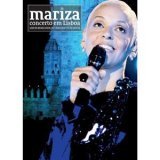![Only When I Dance [DVD] [2009]](/pictures/1098537.jpg) Only When I Dance | DVD | (22/02/2010)
from £9.57
| Saving you £5.42 (56.64%)
| RRP
Only When I Dance | DVD | (22/02/2010)
from £9.57
| Saving you £5.42 (56.64%)
| RRP "Only When I Dance" is Mad Hot Ballroom meets Billy Elliot, set in the favelas of Rio. A classic narrative of coming of age. Of chasing a dream to dance the most perfect dance against all the odds of race and of circumstance.
 Mariza - Concerto Em Lisboa | DVD | (13/11/2006)
from £12.90
| Saving you £3.09 (19.30%)
| RRP
Mariza - Concerto Em Lisboa | DVD | (13/11/2006)
from £12.90
| Saving you £3.09 (19.30%)
| RRP In just a few short years Mariza has become established as one of the finest most exciting most emotional performers in the world today. Her meteoric rise in popularity has been partly due to the trio of wonderful studio albums - ""Fado Em Mim"" ""Fado Curvo"" and ""Transparente"" but also partly to the powerful charismatic performances that mark out the ""live"" Mariza experience. She has grown from her debut at the 300 seater Purcell Room to include several shows at the Royal Festival Hall The Barbican WOMAD The QEH St. David's Hall in Cardiff and full UK tours - not to mention two show-stealing performances on Later With Jools Holland as well as the BBC4 ""Sessions"" concert recorded at the Union Chapel. This performance was recorded with a full orchestra in the beautiful gardens in front of the Torre De Belm in Lisbon with incredible views of the iconic city and in the borders of the Tejo River this was a special evening that had to be captured for the world to see. Track List: 1. Loucura (Live) 2. Medo (Live) 3. Maria Lisboa (Live) 4. Montras (Live) 5. H Uma Msica Do Povo (Live) 6. Menino Do Bairro Negro (Live) 7. Meu Fado Meu (Live) 8. Duas Lgrimas De Orvalho (Live) 9. Cavaleiro Monge (Live) 10. Recusa (Live) 11. H Palavras Que Nos Beijam (Live) 12. Feira De Castro (Live) 13. Desejos Vos (Live) 14. Primavera (Live) 15. Chuva (Live) 16. Gente Da Minha Terra (Live)
 Mariza - Live In London | DVD | (15/11/2004)
from £N/A
| Saving you £N/A (N/A%)
| RRP
Mariza - Live In London | DVD | (15/11/2004)
from £N/A
| Saving you £N/A (N/A%)
| RRP The new queen of the Portuguese folk music known as fado shines in the impressive Mariza Live in London, a 2003 concert recorded at the Union Chapel in London. The twentysomething Lisbon resident has been hailed as the successor to fado legend Amália Rodrigues; now, after two well-received CDs, comes Mariza's first filmed concert performance, and it is stunning. No wonder fado has been compared to the blues: the actual musical content is different, but in terms of both origin (both come from a variety of cultures, in this case including strains of Spanish, Brazilian, and African sounds) and lyrical bent (with its constant element of saudade, roughly translated as yearning or longing, fado, like blues, is mournful, soulful music), it's every bit as deep. Mariza is backed primarily by acoustic guitar, acoustic bass guitar, and "Portuguese guitar," a 12-string instrument that looks something like a lute and sounds a bit like a Greek bouzouki; there is some piano as well, and Guy Barker's muted trumpet provides "O Deserto" with a pronounced jazzy feel. But the singer is the main attraction here, and the power and passion of Mariza's delivery on "Barco Negro" and nearly all the others in the 16-song set, including more upbeat, celebratory numbers like "Oica La o Senhor Vinho" (the introductions are in English, but the tunes are all in Portuguese) are undeniable. Add to that Mariza's black cloak and clothing, her stylish, peroxide-blonde perm, and her highly theatrical movements and expressions, along with the darkened chapel and superb lighting, and you've got an audio-visual experience so dramatic and moving that it easily renders the language barrier irrelevant. --Sam Graham

Please wait. Loading...
This site uses cookies.
More details in our privacy policy